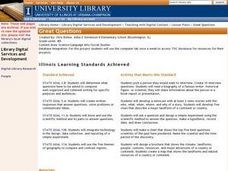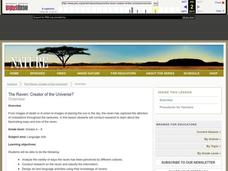DLTK
Groundhog Paper Craft
Get crafty this Groundhog's Day with a hands-on activity that combines creativity and making predictions. Scholars color, cut out, and put together a friendly image of a groundhog and showcase whether they feel the weather will be sunny...
Curated OER
Lakes of Methane on Titan
In this methane lakes worksheet, learners read about the false-color synthetic radar map taken by the Cassini spacecraft indicating methane lakes on Titan. Students solve 4 problems about the surface area of the lakes from the image, and...
Curated OER
Our Savage Planet in the News
Students research volcanoes, storms, atmospheric conditions and extreme environments. They collect information and create a simulation of a science newscast. They watch a video and write a letter as an eyewitness to an avalanche.
Curated OER
Our Savage Planet in the News
Students research volcanoes, storms, atmospheric conditions, etc., find information and collect facts, create a simulation of a science news broadcast, watch a video clip of an avalanche, and create an artistic rendering of one naturally...
University of Wisconsin
Getting the Word Out
An appropriate way to celebrate and conclude the construction of a rain garden is to share it with the community. Small groups collaborate to design an outreach product such as a PowerPoint presentation, brochure, or poster, to draw...
PBS
Blow the Roof Off!
Blow the minds of young scientists with this collection of inquiry-based investigations. Based on a series of eight videos, these "hands-on, minds-on" science lessons engage young learners in exploring a wide range of topics...
Curated OER
Great Questions
Fourth graders research and create questions about a famous person. They create questions in a game format, create a computer generated brochure, and develop rubrics for their finished projects.
PBS
The Elements
An attractive handout displays the periodic table of elements in full color. Each group has its own color, and each element is represented by its name, chemical symbol, atomic number, and atomic weight. What makes this periodic table...
Howard Hughes Medical Institute
Winogradsky Columns: Microbial Ecology in the Classroom
Winogradsky columns are ideal for observing the role of bacteria and other microorganisms in an ecosystem. This student activity guide is complete with data tables for observations and analysis questions for processing what was observed....
Curated OER
Who Has the Data? Monitoring Coral Reefs
Students access data to characterize coral reefs. In this scientific research lesson, students access data and explain the need for such data when monitoring coral reefs. They will identify and explain three major threats to coral reefs.
Curated OER
Biofilms Are Everywhere
Students research biofilms and create brochures. They role play as advertising firm members assigned to educate the general public about biofilms. They create "wanted dead or alive" posters about harmful and helpful biofilms respectively.
Curated OER
The Raven: Creator of the Universe?
Students explore biology by researching birds in class. In this raven identification lesson, students utilize the Internet to identify the anatomy, habits and habitat of ravens. Students write descriptive paragraphs about ravens and read...
Curated OER
A Turning Point in the Space Shuttle Program
Students study about the Columbia crew and their mission, how space shuttles work, and explore the history of the shuttle program. By accessing many websites imbedded in this plan, students gain a deep understanding of the Space Shuttle...
Curated OER
Mystery of the Senses-Vision
Young scholars view six optical illusions and explain why the visual system might interpret them the way it does. They explore how illusions distort our sense of perspective, because they deceive us into seeing what we expect to see. ...
Australian Broadcasting Corporation
Australian Broadcasting Corporation: Walking With Dinosaurs: Fact File: Quetzalcoatlus
A brief description of the quetzacoatlus, "the largest flying creature of all time," which lived during the Late Cretaceous period over 65 million years ago. Find fast facts about this animal's size and fossil location, as well as...
Australian Broadcasting Corporation
Australian Broadcasting Corporation: Walking With Dinosaurs: Fact File: Ophthalmosaurus
Read information about the dolphin-shaped opthalmosaurus, and learn what fossil evidence tells us about this marine dinosaur's hunting, anatomy, and young. View a listing of quick facts about the opthalmosaurus' size and diet, and launch...
Australian Broadcasting Corporation
Australian Broadcasting Corporation: Walking With Dinosaurs: Fact File: Peteinosaurus
Peteinosaurus was a flying reptile from the Late Triassic period, and the fossils left behind tell us much about its anatomy, prey, and flight. This resource provides simple facts as well as several images and a video that let you see...
Australian Broadcasting Corporation
Australian Broadcasting Corporation: Walking With Dinosaurs: Fact File: Anurognathus
Anurognathus, from the Late Jurassic period, was a "tiny pterosaur and a cousin of the dinosaurs." Learn what the one fossil of this prehistoric animal, found in Bavaria, tells us about its diet, anatomy, and size. This resource includes...
Australian Broadcasting Corporation
Australian Broadcasting Corporation: Walking With Dinosaurs: Fact File: Ornithocheirus
Ornithocheirus was a reptile from the Early Cretaceous period, and this resource highlights some of the facts revealed by this large pterosaur's fossilized remains. View a video and several images showing close-ups of its body parts, and...
Australian Broadcasting Corporation
Australian Broadcasting Corporation: Walking With Dinosaurs: Fact File: Rhamphorhynchus
Rhamphorhynchus, a flying reptile from the Late Jurrasic period, had wings up to a meter long. Learn other facts about this prehistoric animal, revealed to us through its fossils, and view a variety of images.
Australian Broadcasting Corporation
Australian Broadcasting Corporation: Walking With Dinosaurs: Fact File: Diplodocus
Diplodocus, a sauropod, "was the longest of the land animals" and its fossilized remains tell us much about its body type, weight, and diet. Read facts about this dinosaur and view several images showing what it looked like while alive.
Australian Broadcasting Corporation
Australian Broadcasting Corporation: News in Science: Galaxy Spinning the Wrong Way
From ABC News in Science, this February 2002 article revolves around findings posted by images from the Hubble Space Telescope which suggest a spiral galaxy spinning in an opposite direction than expected.
Australian Broadcasting Corporation
Australian Broadcasting Corporation: News in Science: Sun's Magnetic Field
From ABC News in Science, this article, "Sun's magnetic field twisted and tangled," discusses images taken of "plumes of gas" which are rising from the sun's corona.























